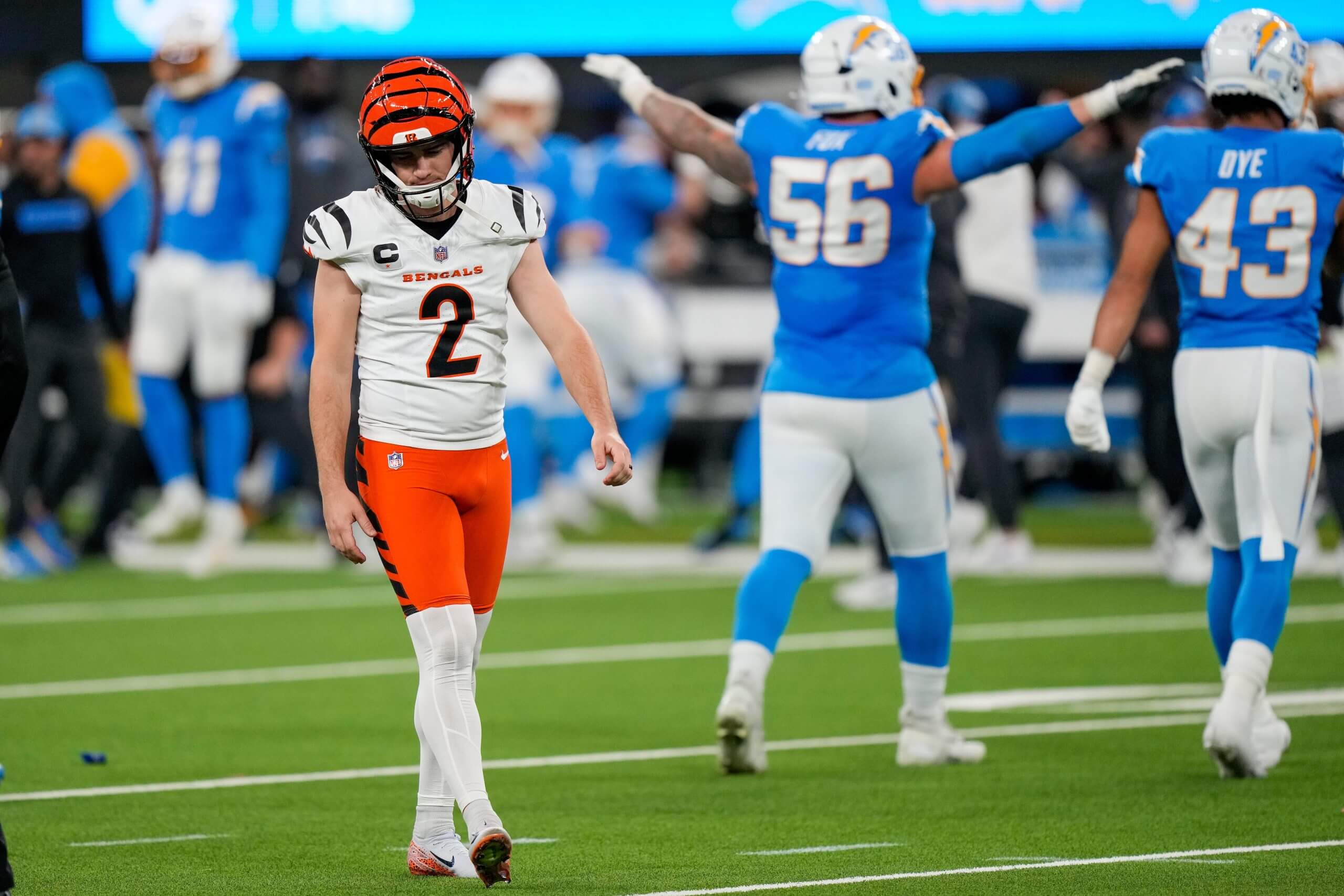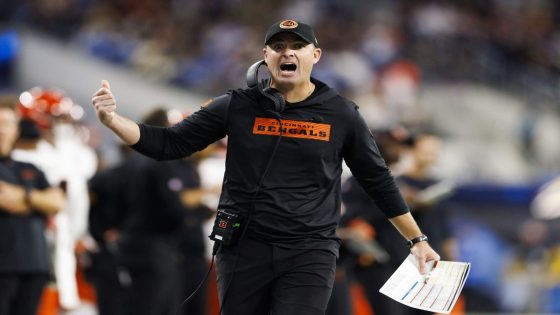CINCINNATI — The answer from Ja’Marr Chase caught the small gathering of media in the visitors locker room at SoFi Stadium by surprise.
The question was merely the word that became the most uttered in the wake of Chargers 34, Bengals 27: Finish. What does that mean and how does he finish better?
“How do I do it? I don’t know,” Chase said. “Ask Zac (Taylor). Ask the coaches. Don’t ask me. It’s not my job. I play football on the field. I don’t call plays for us. So I can’t really do nothing.”
The comment made waves as a potential shot at the head coach. More importantly, the statement cut to the root of all frustration and the 2024 Bengals story.
They can’t finish. The Bengals are 1-6 in one-score games and even the one win barely counts by virtue of a last-second touchdown by Cleveland. In nearly every coin-flip situation this year, their heads came up tails.
The .143 winning percentage in such games this season ranks tied for the 12th-worst in the last two decades. Tied for first on the list are the 2019 Bengals, Taylor’s first season coaching the club.
How much of losing close games is correlative year-over-year and how much is just the randomness of football?
Or, as Chase posed in frustration Sunday night, how much falls squarely on the coaching staff?
“I do think it absolutely turns to me and trying to find ways to continue to put us in the best positions possible,” Taylor said Tuesday. “I think we’ve got a really good process that obviously has put us in a position in a lot of these games to be in a spot to win them. We just haven’t won them. And, you know, there’s not always this easy solution that’s just going to hit us right in the face on how these things can change, but I 100 percent think I’ve gotta uncover every stone. And as coaches, we’ve gotta make sure our process is perfect to win some of the games that in the past we’ve won.”
That’s just it and where so much of the frustration emanates from the front office to the locker room. This isn’t a team that has consistently fallen short in the closing minutes. Over the course of the previous three seasons, the Bengals rank 14th in the league in one-score games, going 14-12.
Throw in the postseason and they were 4-2 in those games.
|
Year
|
Games
|
Record
|
|---|---|---|
|
2019
|
8
|
0-8
|
|
2020
|
8
|
2-5-1
|
|
2021
|
13
|
7-6
|
|
2022
|
10
|
6-4
|
|
2023
|
9
|
5-4
|
|
2024
|
7
|
1-6
|
Yet, this year, the luck has disappeared. The most one-score losses in a season over the last 20 years is nine. If the season’s final six games go like those to this point, that number could be in jeopardy. That doesn’t mean it’s an organizational epidemic.
An analysis of results in one-score games from year to year shows the results aren’t correlative. Not in Cincinnati, or anywhere. ESPN’s Bill Barnwell wrote a thesis on this years ago and the yearly small sample sizes regularly disprove any idea that this issue can be predicted or repeated.
Take, for example, the best and worst of the league over the previous three seasons then how they did in one-score games the next year. There’s little to no rollover.
| Year | Team | Record | Next |
|---|---|---|---|
|
2021
|
 Buccaneers Buccaneers |
6-0
|
6-4
|
|
2022
|
 Vikings Vikings |
11-0
|
6-8
|
|
2022
|
 Eagles Eagles |
7-1
|
8-3
|
|
2023
|
 Steelers Steelers |
9-2
|
5-2
|
|
2021
|
 Raiders Raiders |
7-2
|
4-9
|
|
2021
|
 Falcons Falcons |
7-2
|
5-8
|
| Year | Team | Record | Next |
|---|---|---|---|
|
2021
|
 Bills Bills |
0-5
|
6-3
|
|
2021
|
 Texans Texans |
0-4
|
3-6-1
|
|
2022
|
 Bears Bears |
1-7
|
2-6
|
|
2021
|
 Broncos Broncos |
1-5
|
4-9
|
|
2021
|
 Panthers Panthers |
2-6
|
3-5
|
|
2022
|
 Browns Browns |
2-6
|
6-2
|
Mike Tomlin and the Steelers have been the exception to the rule, finishing with a winning record in one-score games for nine consecutive seasons.
The Bengals were above .500 three years in a row and now can’t buy a close victory.
In losses to the Patriots, the Chiefs, twice against the Ravens and finally against the Chargers, the offense has had an opportunity to post the game-winning score or run out the clock in the closing minutes.
The Bengals failed each time.
There was a three-and-out down six in the opener. Punting back to Patrick Mahomes with under two minutes left and leading in Kansas City. Failure to win in regulation or get closer on the missed field goal in overtime at home against Baltimore. There was the missed two-point conversion at Baltimore. Then against the Chargers, two throws on Joe Burrow’s mind postgame were a barely missed go ball to Chase with just over one minute remaining and a slant he threw behind him a drive earlier.
“We haven’t closed it,” offensive coordinator Dan Pitcher said. “That’s the reality. You can slice that 100 different ways. Trust me, I probably have.”
In assessing what changes can be made to fix the root of all frustration, Pitcher pointed out he fights the battle of emotion versus logic.
“The temptation is to say everything sucks and take a sledgehammer to it,” he said. “That just isn’t the case. Factually, it isn’t. You can do more harm than good if you get so caught in the frustration of your current circumstances that you start to create problems that might not really exist. That is where you have to be calculated about your approach, be disciplined, try to put the emotion aside and go to work. Yeah, we feel like we could be in a way different place right now in all those different scenarios you outlined.”
Inevitably, they’d be in a different place if the defense didn’t rank in the bottom quarter of the league in nearly every category or Evan McPherson made more kicks.
The defense has allowed an average of 31 points in the one-score losses. There’s no way around this debilitating weakness, whether the final minutes of a close game, on third down, in the red zone or opening half of a must-win game Sunday, they are nowhere near consistent enough.
The Bengals can almost handle that, though. They know the deficiencies they are battling there. It’s when the perceived strengths disappear that the total frustration takes over.
Enter McPherson.
Since signing a three-year extension in August, his performance in close games has tanked.
In one-score games alone this year, he’s hit just 64.2 percent of his field goals and missed a PAT, leaving an average of 2.3 points per game on the board.
The previous three years in one-score games (including playoffs), he hit 88.4 percent of his field goals and missed three PATs, leaving an average of 0.84 points per game on the board.

All of this adds up to one tough pill to swallow and a season that could look very different if two or three plays went their way. They didn’t, so now Taylor and the Bengals face the fact the failures leave their season on life support and somebody must be to blame.
“It’s disappointing for everybody right now,” Taylor said. “I still have a lot of confidence in how we go about things and what we have in front of us going forward. Sometimes it just takes winning one of these games to (say), ‘OK, there we go. That monkey’s off our back a little bit, and now let’s go continue and finish.’ And so sometimes it’s just kind of a snowball effect. Unfortunately, the snowball’s gone the wrong way for us this year. There’s no excuse for that, you know? But we’ve got to find solutions and find a way to finish it.”

Free, daily NFL updates direct to your inbox.
Free, daily NFL updates direct to your inbox.
Sign Up
(Top photo of Zac Taylor: Ric Tapia / Getty Images)





